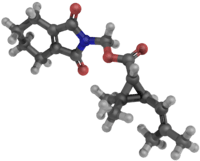Tetramethrin
 | |
 | |
| Names | |
|---|---|
| IUPAC name
(1,3-dioxo-4,5,6,7-tetrahydroisoindol-2-yl)methyl-2,2-dimethyl-3-(2-methylprop-1-enyl)cyclopropane-1-carboxylate | |
| Identifiers | |
| 7696-12-0 | |
| 3D model (Jmol) | Interactive image |
| ChEBI | CHEBI:39397 |
| ChemSpider | 75773 |
| ECHA InfoCard | 100.028.829 |
| EC Number | 214-619-0 |
| KEGG | D07368 |
| PubChem | 83975 |
| RTECS number | GZ1730000 |
| UNII | Z72930Q46K |
| |
| |
| Properties | |
| C19H25NO4 | |
| Molar mass | 331.406 g/mol |
| Appearance | white crystalline solid |
| Odor | strong, pyrethrum-like |
| Density | 1.108 g/cm3 |
| Melting point | 65 to 80 °C (149 to 176 °F; 338 to 353 K) |
| 0.00183 g/100 mL | |
| Solubility | soluble in methane, hexane slightly soluble in acetone, n-octanol, ethanol very slightly soluble in xylene |
| log P | 4.73 |
| Vapor pressure | 10 Pa |
| Refractive index (nD) |
1.5175 |
| Pharmacology | |
| P03BA04 (WHO) QP53AC13 (WHO) | |
| Hazards | |
| Lethal dose or concentration (LD, LC): | |
| LD50 (median dose) |
20,000 mg/kg (rat, oral) |
| Except where otherwise noted, data are given for materials in their standard state (at 25 °C [77 °F], 100 kPa). | |
| | |
| Infobox references | |
Tetramethrin is a potent synthetic insecticide in the pyrethroid family.[1] It is a white crystalline solid with a melting point of 65-80 °C. The commercial product is a mixture of stereoisomers.
It is commonly used as an insecticide, and affects the insect's nervous system. It is found in many household insecticide products.[2]
References
- ↑ Tetramethrin, alanwood.net
- ↑ Tetramethrin, Household Products Database
External links
- Pyrethrins and Pyrethroids Fact Sheet - National Pesticide Information Center
- Pyrethrins and Pyrethroids Pesticide Information Profile - Extension Toxicology Network
- Tetramethrin in the Pesticide Properties DataBase (PPDB)
This article is issued from Wikipedia - version of the 11/30/2015. The text is available under the Creative Commons Attribution/Share Alike but additional terms may apply for the media files.